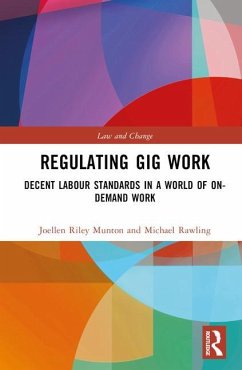Joellen Riley Munton, Michael Rawling
Regulating Gig Work
Decent Labour Standards in a World of On-demand Work
Joellen Riley Munton, Michael Rawling
Regulating Gig Work
Decent Labour Standards in a World of On-demand Work
- Gebundenes Buch
- Merkliste
- Auf die Merkliste
- Bewerten Bewerten
- Teilen
- Produkt teilen
- Produkterinnerung
- Produkterinnerung
Digital revolution demands new approaches to regulating work. The "Uberisation of work" is not in reality a new phenomenon. It reintroduces the practices of 'on demand' engagement of labour common prior to the development of continuing employment.
Andere Kunden interessierten sich auch für
![Lifelong Learning in Paid and Unpaid Work Lifelong Learning in Paid and Unpaid Work]() Lifelong Learning in Paid and Unpaid Work65,99 €
Lifelong Learning in Paid and Unpaid Work65,99 €![Work and Human Behavior Work and Human Behavior]() Walter S. NeffWork and Human Behavior73,99 €
Walter S. NeffWork and Human Behavior73,99 €![Lifelong Learning in Paid and Unpaid Work Lifelong Learning in Paid and Unpaid Work]() D. W. LivingstoneLifelong Learning in Paid and Unpaid Work231,99 €
D. W. LivingstoneLifelong Learning in Paid and Unpaid Work231,99 €![Belonging in Europe - The African Diaspora and Work Belonging in Europe - The African Diaspora and Work]() Belonging in Europe - The African Diaspora and Work67,99 €
Belonging in Europe - The African Diaspora and Work67,99 €![Gendered Work in Asian Cities Gendered Work in Asian Cities]() Ann BrooksGendered Work in Asian Cities76,99 €
Ann BrooksGendered Work in Asian Cities76,99 €![Gender Equality and Work-Life Balance Gender Equality and Work-Life Balance]() Sarah BlitheGender Equality and Work-Life Balance220,99 €
Sarah BlitheGender Equality and Work-Life Balance220,99 €![Between Work and Leisure Between Work and Leisure]() Robert A. StebbinsBetween Work and Leisure67,99 €
Robert A. StebbinsBetween Work and Leisure67,99 €-
-
-
Digital revolution demands new approaches to regulating work. The "Uberisation of work" is not in reality a new phenomenon. It reintroduces the practices of 'on demand' engagement of labour common prior to the development of continuing employment.
Hinweis: Dieser Artikel kann nur an eine deutsche Lieferadresse ausgeliefert werden.
Hinweis: Dieser Artikel kann nur an eine deutsche Lieferadresse ausgeliefert werden.
Produktdetails
- Produktdetails
- Verlag: Routledge
- Seitenzahl: 136
- Erscheinungstermin: 12. Dezember 2023
- Englisch
- Abmessung: 240mm x 161mm x 12mm
- Gewicht: 376g
- ISBN-13: 9781032251448
- ISBN-10: 1032251441
- Artikelnr.: 69030917
- Herstellerkennzeichnung
- Libri GmbH
- Europaallee 1
- 36244 Bad Hersfeld
- gpsr@libri.de
- Verlag: Routledge
- Seitenzahl: 136
- Erscheinungstermin: 12. Dezember 2023
- Englisch
- Abmessung: 240mm x 161mm x 12mm
- Gewicht: 376g
- ISBN-13: 9781032251448
- ISBN-10: 1032251441
- Artikelnr.: 69030917
- Herstellerkennzeichnung
- Libri GmbH
- Europaallee 1
- 36244 Bad Hersfeld
- gpsr@libri.de
Michael Rawling, University of Technology Sydney, Faculty of Law. Joellen Riley Munton, University of Technology Sydney, Faculty of Law, and Professor Emerita, The University of Sydney.
Preface viii
1 Context and history 1
Introduction 1
Common features of platform-mediated work 3
Labour law avoidance 4
'Employment' 5
Algorithmic control 8
'Multi-apping' 10
Regulating for safe, fair, and dignified work 12
2 A global perspective 16
Introduction 16
Could development of further ILO standards promote gig worker rights? 17
OECD 20
The centrality of domestic regulation 20
Europe 21
European Union 21
Employment status under the proposed EU Directive 21
Regulation of algorithmic management 23
Dispute resolution and enforcement 23
Individual European countries 24
United Kingdom 25
United States 26
New Zealand 27
Conclusion 28
3 Overview of workers' essential needs and forms of legal protection 29
Introduction 29
'Deeming' provisions 32
'Third way' statutory definitions 35
Special regulatory schemes for contractors 38
New South Wales industrial laws 39
Operation of the Chapter 6 regime 40
Victorian owner driver scheme 41
Western Australian owner driver scheme 42
Queensland 43
Road Safety Remuneration Tribunal 45
Franchising code of conduct 46
Unfair contracts review 49
Conclusion 50
4 Pay and safety 51
Introduction 51
Why substantive labour standards should apply to gig workers 52
Gig workers' experience of low pay and poor safety 53
Pay and safety link evident in gig work 56
The current regulation and its shortcomings 57
WHS laws 57
Workers' compensation 58
The appropriate methods of producing a socially beneficial remuneration
standard 60
Proposed Reforms 62
Conclusion 64
5 Procedural rights: Freedom of association and job security standards 65
Introduction 65
The function and benefits of collective bargaining 66
Why gig workers deserve collective bargaining rights 67
Establishing collective bargaining for gig workers - possibilities and
obstacles 67
Realising substantive collective bargaining rights for gig workers 70
Protection of job security 70
Dispute resolution 73
Conclusion 76
6 Exclusion from jurisdiction as a regulatory strategy 78
Introduction 78
Rideshare as a 'disruptor' 78
Bans across the globe 79
United States 80
Europe 80
United Kingdom 81
Scandinavia 82
India 82
Other countries 82
Bans in historical context: Previous restrictions on the free flow of
capital 82
Digital labour platform responses to bans 84
The cloud of words 84
Enter markets and keep operating: Business as usual despite bans 85
Using violence against rideshare drivers to gain support 86
The emergency 'kill' switch 86
Big spending on lobbying 87
Overall effectiveness of the bans 87
'Regulatory entrepreneurship' business model and bans 90
Beyond law - compliance measures to combat disruption and improve bans
policy 91
Conclusion 92
7 Organisational forms to enhance worker control and ownership 94
Democracy at work for platform workers 94
Worker participation in corporations 96
Cooperative enterprises 97
RideAustin - the not-for-profit 97
ATX - taxi driver cooperative 99
Governance of cooperatives 99
Worker ownership trusts 101
Conclusion 102
8 Concluding thoughts 104
Regulating on-demand work, everywhere 104
Beyond 'employment' 105
Future-proofing labour regulation 106
Supervision 107
Bibliography 109
Index 121
1 Context and history 1
Introduction 1
Common features of platform-mediated work 3
Labour law avoidance 4
'Employment' 5
Algorithmic control 8
'Multi-apping' 10
Regulating for safe, fair, and dignified work 12
2 A global perspective 16
Introduction 16
Could development of further ILO standards promote gig worker rights? 17
OECD 20
The centrality of domestic regulation 20
Europe 21
European Union 21
Employment status under the proposed EU Directive 21
Regulation of algorithmic management 23
Dispute resolution and enforcement 23
Individual European countries 24
United Kingdom 25
United States 26
New Zealand 27
Conclusion 28
3 Overview of workers' essential needs and forms of legal protection 29
Introduction 29
'Deeming' provisions 32
'Third way' statutory definitions 35
Special regulatory schemes for contractors 38
New South Wales industrial laws 39
Operation of the Chapter 6 regime 40
Victorian owner driver scheme 41
Western Australian owner driver scheme 42
Queensland 43
Road Safety Remuneration Tribunal 45
Franchising code of conduct 46
Unfair contracts review 49
Conclusion 50
4 Pay and safety 51
Introduction 51
Why substantive labour standards should apply to gig workers 52
Gig workers' experience of low pay and poor safety 53
Pay and safety link evident in gig work 56
The current regulation and its shortcomings 57
WHS laws 57
Workers' compensation 58
The appropriate methods of producing a socially beneficial remuneration
standard 60
Proposed Reforms 62
Conclusion 64
5 Procedural rights: Freedom of association and job security standards 65
Introduction 65
The function and benefits of collective bargaining 66
Why gig workers deserve collective bargaining rights 67
Establishing collective bargaining for gig workers - possibilities and
obstacles 67
Realising substantive collective bargaining rights for gig workers 70
Protection of job security 70
Dispute resolution 73
Conclusion 76
6 Exclusion from jurisdiction as a regulatory strategy 78
Introduction 78
Rideshare as a 'disruptor' 78
Bans across the globe 79
United States 80
Europe 80
United Kingdom 81
Scandinavia 82
India 82
Other countries 82
Bans in historical context: Previous restrictions on the free flow of
capital 82
Digital labour platform responses to bans 84
The cloud of words 84
Enter markets and keep operating: Business as usual despite bans 85
Using violence against rideshare drivers to gain support 86
The emergency 'kill' switch 86
Big spending on lobbying 87
Overall effectiveness of the bans 87
'Regulatory entrepreneurship' business model and bans 90
Beyond law - compliance measures to combat disruption and improve bans
policy 91
Conclusion 92
7 Organisational forms to enhance worker control and ownership 94
Democracy at work for platform workers 94
Worker participation in corporations 96
Cooperative enterprises 97
RideAustin - the not-for-profit 97
ATX - taxi driver cooperative 99
Governance of cooperatives 99
Worker ownership trusts 101
Conclusion 102
8 Concluding thoughts 104
Regulating on-demand work, everywhere 104
Beyond 'employment' 105
Future-proofing labour regulation 106
Supervision 107
Bibliography 109
Index 121
Preface viii
1 Context and history 1
Introduction 1
Common features of platform-mediated work 3
Labour law avoidance 4
'Employment' 5
Algorithmic control 8
'Multi-apping' 10
Regulating for safe, fair, and dignified work 12
2 A global perspective 16
Introduction 16
Could development of further ILO standards promote gig worker rights? 17
OECD 20
The centrality of domestic regulation 20
Europe 21
European Union 21
Employment status under the proposed EU Directive 21
Regulation of algorithmic management 23
Dispute resolution and enforcement 23
Individual European countries 24
United Kingdom 25
United States 26
New Zealand 27
Conclusion 28
3 Overview of workers' essential needs and forms of legal protection 29
Introduction 29
'Deeming' provisions 32
'Third way' statutory definitions 35
Special regulatory schemes for contractors 38
New South Wales industrial laws 39
Operation of the Chapter 6 regime 40
Victorian owner driver scheme 41
Western Australian owner driver scheme 42
Queensland 43
Road Safety Remuneration Tribunal 45
Franchising code of conduct 46
Unfair contracts review 49
Conclusion 50
4 Pay and safety 51
Introduction 51
Why substantive labour standards should apply to gig workers 52
Gig workers' experience of low pay and poor safety 53
Pay and safety link evident in gig work 56
The current regulation and its shortcomings 57
WHS laws 57
Workers' compensation 58
The appropriate methods of producing a socially beneficial remuneration
standard 60
Proposed Reforms 62
Conclusion 64
5 Procedural rights: Freedom of association and job security standards 65
Introduction 65
The function and benefits of collective bargaining 66
Why gig workers deserve collective bargaining rights 67
Establishing collective bargaining for gig workers - possibilities and
obstacles 67
Realising substantive collective bargaining rights for gig workers 70
Protection of job security 70
Dispute resolution 73
Conclusion 76
6 Exclusion from jurisdiction as a regulatory strategy 78
Introduction 78
Rideshare as a 'disruptor' 78
Bans across the globe 79
United States 80
Europe 80
United Kingdom 81
Scandinavia 82
India 82
Other countries 82
Bans in historical context: Previous restrictions on the free flow of
capital 82
Digital labour platform responses to bans 84
The cloud of words 84
Enter markets and keep operating: Business as usual despite bans 85
Using violence against rideshare drivers to gain support 86
The emergency 'kill' switch 86
Big spending on lobbying 87
Overall effectiveness of the bans 87
'Regulatory entrepreneurship' business model and bans 90
Beyond law - compliance measures to combat disruption and improve bans
policy 91
Conclusion 92
7 Organisational forms to enhance worker control and ownership 94
Democracy at work for platform workers 94
Worker participation in corporations 96
Cooperative enterprises 97
RideAustin - the not-for-profit 97
ATX - taxi driver cooperative 99
Governance of cooperatives 99
Worker ownership trusts 101
Conclusion 102
8 Concluding thoughts 104
Regulating on-demand work, everywhere 104
Beyond 'employment' 105
Future-proofing labour regulation 106
Supervision 107
Bibliography 109
Index 121
1 Context and history 1
Introduction 1
Common features of platform-mediated work 3
Labour law avoidance 4
'Employment' 5
Algorithmic control 8
'Multi-apping' 10
Regulating for safe, fair, and dignified work 12
2 A global perspective 16
Introduction 16
Could development of further ILO standards promote gig worker rights? 17
OECD 20
The centrality of domestic regulation 20
Europe 21
European Union 21
Employment status under the proposed EU Directive 21
Regulation of algorithmic management 23
Dispute resolution and enforcement 23
Individual European countries 24
United Kingdom 25
United States 26
New Zealand 27
Conclusion 28
3 Overview of workers' essential needs and forms of legal protection 29
Introduction 29
'Deeming' provisions 32
'Third way' statutory definitions 35
Special regulatory schemes for contractors 38
New South Wales industrial laws 39
Operation of the Chapter 6 regime 40
Victorian owner driver scheme 41
Western Australian owner driver scheme 42
Queensland 43
Road Safety Remuneration Tribunal 45
Franchising code of conduct 46
Unfair contracts review 49
Conclusion 50
4 Pay and safety 51
Introduction 51
Why substantive labour standards should apply to gig workers 52
Gig workers' experience of low pay and poor safety 53
Pay and safety link evident in gig work 56
The current regulation and its shortcomings 57
WHS laws 57
Workers' compensation 58
The appropriate methods of producing a socially beneficial remuneration
standard 60
Proposed Reforms 62
Conclusion 64
5 Procedural rights: Freedom of association and job security standards 65
Introduction 65
The function and benefits of collective bargaining 66
Why gig workers deserve collective bargaining rights 67
Establishing collective bargaining for gig workers - possibilities and
obstacles 67
Realising substantive collective bargaining rights for gig workers 70
Protection of job security 70
Dispute resolution 73
Conclusion 76
6 Exclusion from jurisdiction as a regulatory strategy 78
Introduction 78
Rideshare as a 'disruptor' 78
Bans across the globe 79
United States 80
Europe 80
United Kingdom 81
Scandinavia 82
India 82
Other countries 82
Bans in historical context: Previous restrictions on the free flow of
capital 82
Digital labour platform responses to bans 84
The cloud of words 84
Enter markets and keep operating: Business as usual despite bans 85
Using violence against rideshare drivers to gain support 86
The emergency 'kill' switch 86
Big spending on lobbying 87
Overall effectiveness of the bans 87
'Regulatory entrepreneurship' business model and bans 90
Beyond law - compliance measures to combat disruption and improve bans
policy 91
Conclusion 92
7 Organisational forms to enhance worker control and ownership 94
Democracy at work for platform workers 94
Worker participation in corporations 96
Cooperative enterprises 97
RideAustin - the not-for-profit 97
ATX - taxi driver cooperative 99
Governance of cooperatives 99
Worker ownership trusts 101
Conclusion 102
8 Concluding thoughts 104
Regulating on-demand work, everywhere 104
Beyond 'employment' 105
Future-proofing labour regulation 106
Supervision 107
Bibliography 109
Index 121








